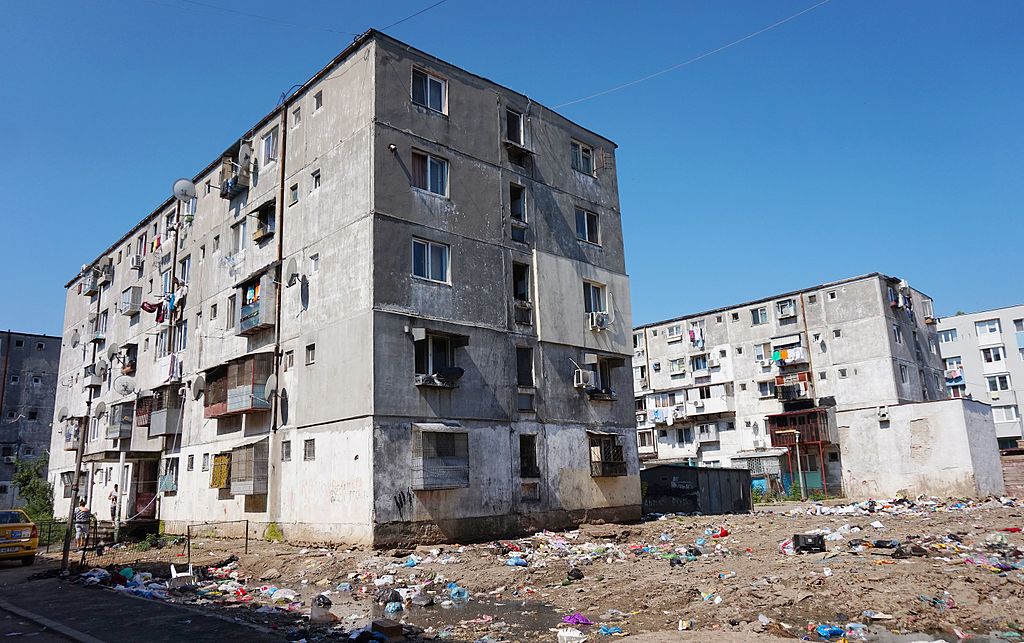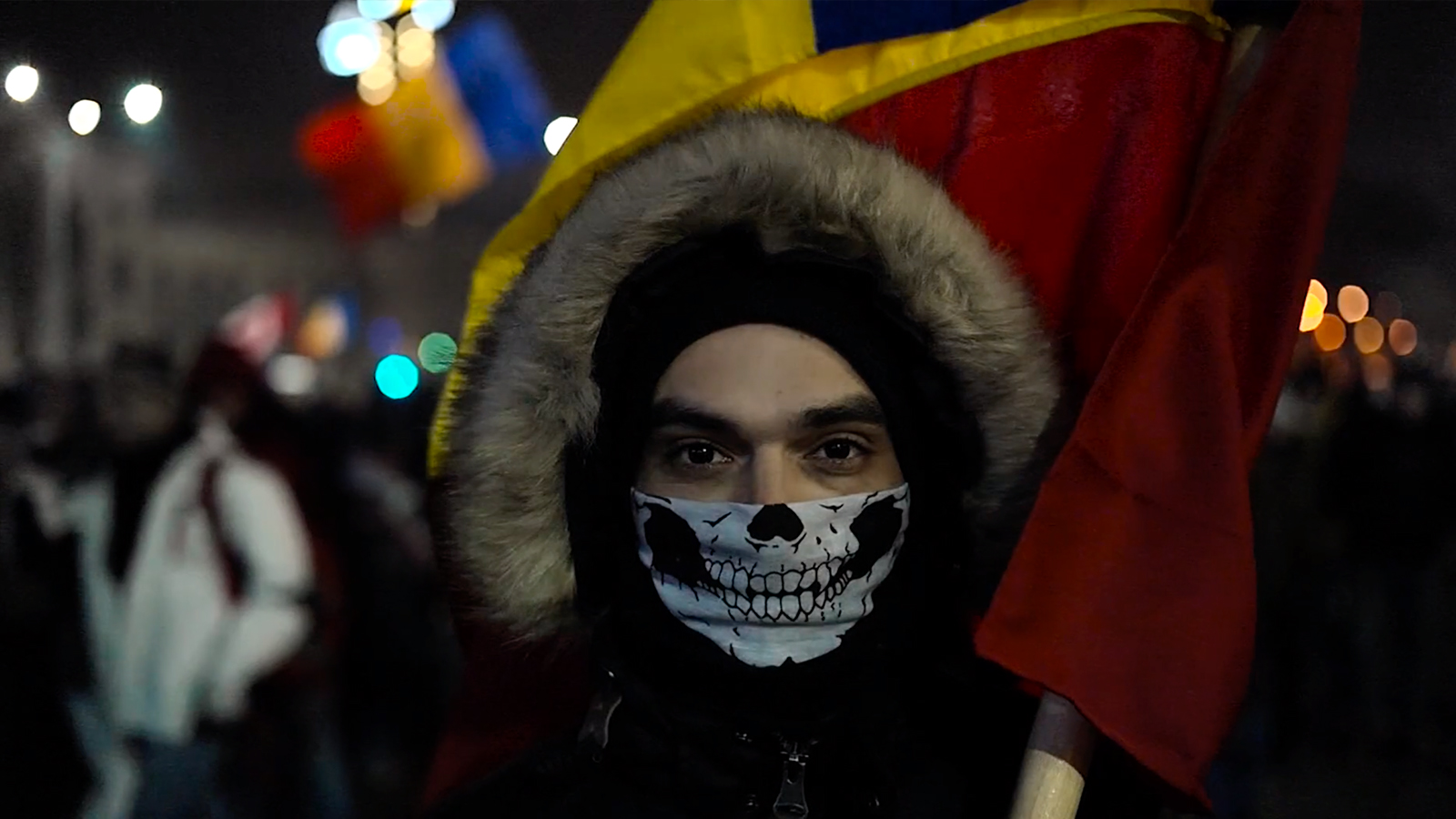
Pro-Irishness was part of the Democratic-Party-dominated political culture that MAGA despises and whose day is done. Time for Ireland to opt once and for all for Brussels over Boston, argues the co-editor of the Dublin Review of Books.
The strategies that Romanians employ to negotiate the capitalist economy are much like those they used under socialism. Nepotism and bribery are seen as necessary for navigating a broken system. At the political level, however, recent anti-corruption campaigns have brought spectacular results. Jill Massino examines how the shift to a market economy and ongoing corruption have affected individuals’ civic identities, everyday practices and perceptions of the state and the EU.
In the Romanian film Graduation (Bacalaureat) the main character, a doctor, explains to his teenage daughter why ‘going against the rules’ (i.e. cheating) is justified in some cases. In the ensuing exchange, he urges her to place an identifying mark on her baccalaureate exam so it can be favourably graded, ensuring her matriculation at Cambridge University, where she has received a scholarship.
The doctor rationalizes such duplicity on the basis of his daughter’s unfitness to sit for the exam as a result of a recent sexual assault. He also emphasizes the sacrifices he has made, including paying for years of private tutoring. Finally, he references the culture of corruption in Romania, where success requires not just merit, but connections, favours, or engaging in ethically questionable behaviour, noting, ‘Sometimes in life it’s the results that count. Don’t get me wrong. We raised you to always be honest. But this is the world we live in, and sometimes we have to fight with their weapons. So, this is a precaution that gets you where you want to go and where you deserve. From then on you can do what you think is best’1.
Accordingly, this ‘ends justify the means’ approach is a response to a system that is not only, or not even necessarily, based on merit, but on who you know or how much you are able to pay. It also reflects a common practice in Romania, a form of ‘managing’ that is often essential for success and, in some cases, survival.
This article is also published in the anthology The Legacy of Division: East and West after 1989, published in English and in Slovenian. Listen to the author, Jill Massino discuss her take with three other contributors at the dual book launch.
Scholars have offered various explanations for eastern Europe’s circuitous and often halting journey to pluralism. While some have emphasized local idealization of liberal democracy, marketization, and western values, others point to an embrace of nationalism, conservatism, and illiberal politics. Some also stress economic factors, including the adoption of neoliberal and austerity measures, often initiated at the behest of international bodies, as a condition of EU membership or as a consequence of the global financial crisis. Moreover, they highlight local elites’ efforts to secure privileges and consolidate power through deals with foreign investors or in adopting populist strategies, from claiming to defend the ‘true Europe’ by condemning immigration and ‘EU imperialism’ to addressing inequality by enhancing social entitlements.2
Just as elites adopt strategies for managing change, so do ordinary individuals, though often to receive fair treatment or to ensure material security rather than for personal enrichment. These strategies include bribery and favouritism and are responses to the destabilizing effects of neoliberalism and the global economic crisis. They are also responses to institutional dysfunction and corruption, both of which characterized the periods before and after 1989.

Photo via torange.biz
Increased opportunity for exercising agency in the spheres of politics, economics, and culture are undoubtedly important gains for east Europeans whose civil rights were restricted under socialism, even though they did enjoy certain economic and social rights. With respect to employment in particular, work is no longer a state-mandated duty, but an individual pursuit. At the same time, work is no longer a right guaranteed by the state. Thus, the onus is on the individual to find their place and succeed in the new economic environment. Consequently, for some the shift to a market economy has been empowering and even liberating, while for others it has produced uncertainty and frustration, as choice is not synonymous with boundless opportunities but is rather a function of market forces and public policy.
Moreover, corruption has been a central feature of economic transformation, underscoring the role of elites in limiting or undermining choice. Yet, because capitalism has been presented as the only viable economic system, there is no bogeyman (i.e. the state) that can be targeted for social inequality. Individuals must sink or swim, adopting strategies for navigating the choppy waters of late (or ‘wild’) capitalism, or descend deeper into poverty. According to this logic, material uncertainty is not the product of a flawed system but of having made poor choices. Choice and agency thus mask constraints embedded in the neoliberal system, the reality that industries collapsed overnight – and with them vital relationships and networks – and that local elites and external bodies dominated economic and institutional change.
In Romania, as elsewhere in eastern Europe, individuals employ various strategies to negotiate the capitalist economy, including cobbling together numerous jobs, both formal and informal, and emigrating for work. They also rely on favouritism or bribes in return for a job, promotion, or to secure an offspring’s place at university. These are not novel practices as under socialism people also commuted for work, albeit within the confines their country’s borders, and worked in the underground economy to supplement low wages and as barter for essential goods and, sometimes, luxury items.
In socialist Romania, reliance on informal networks and bribes was a means of ‘solving problems’ and considered a rational response to a system that promised a ‘golden age’ but, by the 1980s, delivered empty store shelves and dark streets. Pluralism, in the form of liberal democracy and marketization, by contrast, promised a transparent and ideologically sound system wherein diligence and merit would ensure at least a decent standard of living. This, however, has not been the reality for many. Indeed, understanding, let alone negotiating, the market economy has been a frustrating and fraught process. So too has expressing dismay with said system because, at least until the global financial crisis, identifying drawbacks of capitalism was regarded as part of a ‘backward mentality’, reflective of nostalgia or even preference for the socialist system.
How then does the post-socialist economy differ from the socialist command economy that guaranteed work and promised an ever-increasing standard of living, but failed to deliver? Do capitalism and liberal democracy collectively constitute another utopia that has failed to make good on the promise of a better life? More importantly, how has the shift to a market economy and ongoing corruption affected individuals’ civic identities, everyday practices, and their perceptions of the state and the EU?

Ferentari: Bucharest’s Post-Socialist Ghetto
Photo by Tiia Monto from Wikimedia Commons
Corruption has been a central feature of Romania’s transition to pluralism. While this entailed adopting (and adapting to) a new economic and political order, it did not necessarily include new actors as former second-tier communists and members of the nomenklatura and Securitate (the communist secret police) translated their political capital into economic capital. Accordingly, some Romanians have highlighted continuities between the two systems. As one woman remarked in 2003: ‘The government is not interested. Look at them, the thieves, the corruption, all the villas they built … more and more money in foreign banks and villas on the French Riviera and other places like that. The colour of the party doesn’t matter. There was the PCR [Romanian Communist Party] under communism, at least I knew there was only one. Now, who knows how many PCRs there are? It’s just old wine in new bottles’.3
Numerous elites profited handsomely from privatization. In certain cases, managers purposely drove communist-era factories into bankruptcy, only to purchase them for a pittance and resell them at considerably higher prices, often to foreign investors. Such pilfering of public property, also known as ‘the great post-communist theft’, deviated sharply from the path experts envisaged post-socialist economies would follow, not to mention the one ordinary Romanians hoped their society would follow.4 This practice continued during pre- and post-EU accession periods as ‘local barons’ amassed millions from EU-funded projects, while policymakers justified neoliberal measures with respect to the need to ‘return to Europe’ by integrating into the EU.
Yet, corruption is by no means the preserve of privileged elites. Use of bribery and connections is an everyday practice, visible on multiple levels. It has been sustained by poorly paid doctors, some of whom require money in exchange for services, even though healthcare is nominally a universal, state-subsidized entitlement. As one person noted: ‘I’ve paid a lot of money — the equivalent of 5,000 Euros — in the hospital from the doorman to nurses, assistants, residents, doctors and for medicine for my husband, who had no hope of staying alive. Generally, you have to give bribes to get anything done. That’s how it was in the Ceaușescu times, and that’s how it has remained until today’.5
Bribery is also sustained by the patient or the patient’s family. Indeed, refusal by medical staff to accept bribes or ‘gifts’ has even caused altercations between staff and patients as the latter believe they are essential for receiving high-quality care. While against the Hippocratic Oath, the practice of accepting money for services is a strategy, a form of managing a system that does not – or, until the considerable rise in doctors’ and nurses’ salaries in 2018, did not – adequately remunerate overworked professionals who perform vital services. It is also a continuation of communist-era practices, when it was customary to remunerate doctors for their services. Finally, such ‘gifts’ are part of the moral economy, a form of gratitude for services rendered.
The education system is also rife with corruption, particularly at the secondary and university level. As one university professor noted in 2017: ‘I have been put under pressure to promote students who never attended class. I have been offered bribes for this and I have been sanctioned because of my integrity … My colleagues took huge amounts of money from selling graduation papers and grades, also taking homemade products from the ‘candidates,’ like cheese, alcoholic beverages, even eggs!’6 Rigging exams or grading them favourably is not uncommon. As in the case of doctors, numerous teachers and professors rely on bribery to supplement low salaries.
Corruption is deeply entrenched in the business world as well, and even entrepreneurs who seek to act ethically cannot wholly avoid it. For instance, a bribe is often required to ensure that the paperwork needed for registering a business is processed in a timely fashion or does not ‘get lost’.7
Just as the nature of the bribe or favour varies so does the impetus behind it. While some rely on bribery and favouritism for personal enrichment or to enjoy certain advantages, others do so to secure goods and services to which they are entitled (e.g. proper treatment in hospital; timely filing of paperwork), or to level the playing field. Indeed, these practices are often considered essential for dealing with everyday uncertainty as well as state institutions, which are underfunded, under-resourced and, to varying degrees, dysfunctional. Thus, ‘gift giving’ ensures a modicum of predictability in a context characterized by institutional dysfunction and precarity.8 Moreover, because merit is often insufficient — and in some cases not even necessary — for securing a place at university or a promotion, bribery is viewed by some as essential for advancement.
Thus, while people complain about such practices, they regard them as necessary evils. Or they rationalize them as exceptional — desperate measures born out of circumstance. As the teacher in Graduation, who agrees to favourably mark the protagonist’s daughter’s exam, asserts: ‘But I don’t do such things. This house and everything you see here was earned honestly’, inferring that while he will ‘help’ a friend of a friend in this one, isolated instance, it is not reflective of his overall character. Regardless of the impetus or justification, these forms of managing sustain the very system that necessitates them, undermining equal access to services, resources, and opportunities.
That said, some refuse to rely on such forms of managing, one reason why many Romanians, especially young and middle-aged individuals, have chosen to leave the country altogether. Indeed, corruption, alongside lack of opportunity and low wages, has compelled some 3.4 million Romanians to emigrate since EU accession. Currently, Romania ranks just behind war-torn Syria in terms of emigration growth rate.9
Corruption not only poses threats to promoting an ethical and meritorious society but can prove deadly, as has been the case of those who cannot afford to pay for surgeries and other vital treatments. Corruption was also responsible for the death of sixty-four people after a fire broke out at the Colectiv club in Bucharest in 2015. In this case, the club had been granted an operating license despite lacking the required safety permit. The calamity also exposed corporate corruption as it was discovered that hospitals were stocked with diluted disinfectants, supplied by the Romanian company Hexi Pharma, which contributed to a rise in infections, some of them deadly.
The public outcry following the Colectiv club fire proved that tragedy can bring about change. In its wake, Prime Minister Victor Ponta resigned and the ‘Corruption Kills’ (Corupția Ucide) campaign emerged, building on prior anti-corruption protests: in 2012 against the partial privatization of the healthcare system, and in 2013 against a proposed mining project in Roșia Montană. These culminated in the massive #rezist protests of winter 2017 – the largest protests in Romania since 1989 – in response to an emergency ordinance passed by the ruling Social Democratic Party (PSD) that decriminalized low-level corruption offenses among public officials. Although utilizing new forms of media, protesters also drew on older symbols – such as the communist flag with a hole in it – underscoring the salience of 1989 as a rallying cry for transparent, lawful, and accountable governance. At the same time, they emphasized the threat posed by corruption to personal health and safety.10
Protests continued into the next year, with August 2018 witnessing civic mobilization in response to the PSD’s firing of Laura Codruţa Kövesi from her post as Prosecutor General of the National Anti-Corruption Directorate (Direcţia Naţională Anticorupţie, DNA) and efforts to weaken the judiciary and hinder anti-corruption initiatives. These protests, for which thousands from the Romanian diaspora returned, were peaceful with the exception of those in Bucharest, where they were violently repressed by police, causing 452 injuries and eliciting national and international outrage. This extreme response dealt a serious blow to the PSD’s legitimacy, evident in their poor performance in the 2019 EU elections and in the widespread support for pro-EU parties and a referendum against the PSD’s efforts to reverse anti-corruption measures and alter judicial legislation.
Institutional efforts to curb high and mid-level corruption in Romania have also been impressive, especially under the National Anti-Corruption Directorate. Established in 2002 as a condition of EU membership, the DNA handed down 4,720 final corruption sentences between 2010 and 2017, including the arrest of local and high-ranking politicians, among them ministers, members of Parliament, generals, and former Prime Minister Adrian Năstase.11 The DNA also built the case against then-PSD chief Liviu Dragnea for abuse of office, for which he was convicted by the Romanian Supreme Court and is currently serving a three-and-a-half-year prison sentence.
Although the DNA has been criticized as a political tool, especially by PSD supporters who claim PSD officials have been unjustly targeted, its efforts in combatting corruption have restored at least a modicum of faith in the power of some institutions’ capacity to enforce the law. According to a November 2018 INSCOP survey, 39.7 percent of respondents expressed high or very high confidence in the agency, while these figures for the Parliament and government were 9.8 and 12.8 percent respectively.12
13 The DNA’s efforts have been bolstered by the EU-imposed Cooperation and Verification Mechanism (CVM), which monitors and produces public reports on Romania’s application of EU laws and its fight against corruption, organized crime, and judicial reform.14 Moreover, the European Commission has put pressure on Romania, recently threatening the country with sanctions, travel prohibitions, cuts to EU-funding, and the activation of Article 7 procedures after the PSD’s efforts to weaken the judiciary.
Yet what of everyday corruption? Rooting out this type of corruption requires monitoring institutional practices to ensure that universal entitlements are available to all and that educational and professional advancement is based on merit. The General Directorate of Anti-Corruption (Direcţia Generală Anticorupţie, DGA, within the Ministry of the Interior) deals with petty corruption and organizes awareness-raising campaigns and educational programs on corruption. It also runs a toll-free hotline for anonymous reporting of corruption offences. In addition, Funky Citizens, an NGO designed by young adults, promotes public reform by collecting data on government spending and institutional corruption. Their website also lists the ‘cost’ (the bribe required) for accessing various public services, simultaneously advertising the ‘best deal’ for said services and exposing public graft.
As Stephen Holmes and Ivan Krastev assert: ‘In 1989, central and eastern Europeans were not dreaming of some perfect world that had never existed. They were longing for a “normal life” in a “normal country”’.15 This aspiration has changed little in the last 30 years, indicating that Romania still has a long way to go.
But what does a ‘normal life’ look like to Romanians? Individuals that I interviewed between 2003 and 2012 emphasized, above all, curtailment of corruption, institutional transparency, equality of opportunity, and the prospect of living decently and in dignity. While normality appears elusive for many in the former Eastern Bloc, this sentiment is not unique to people in the Eastern part of the continent. Normality, or what is perceived as such, has slipped away for people across Europe as a result of the global financial crisis and austerity policies. In some cases, material insecurity and rising inequality have led to a de-coupling of democracy and prosperity, increasing the appeal of ‘populist solutions’. Consequently, East and West have converged as a result of both positive and negative developments: EU expansion and the increased flow of goods and peoples, but also social dislocation, populist and isolationist politics, and Euroscepticism. The question might then be: what are the prospects for normality in an era of austerity and uncertainty and in societies characterized by corruption and dysfunctional institutions.Civic mobilization is certainly part of the answer. The election of Zuzana Čaputová as president of Slovakia and the mass protests against Prime Minister Andrej Babiš in the Czech Republic (the largest since 1989) illustrate that many people in the region may recognize that this is the world they live in, however, they refuse to accept it. The same applies to the hundreds of thousands of Romanians who have protested against corruption and austerity over the last decade and continue to do so today.

Still frame from Anti-corruption street protests in Romania by Salvatore Delle Femmine from Vimeo
Indeed, anger over corruption and institutional dysfunction once again reached a boiling point in late July 2019, when it was revealed that the Romanian police took nearly a day to enter the house where a 15-year-old girl had been raped and murdered, even though she had phoned the European emergency number three times after she was kidnapped.16 The incident sparked public outcry and a number of high-level resignations. Revelations about police and senior politicians’ links to organized crime and human-trafficking networks followed, further exposing institutional corruption and eliciting mass outrage. This time, high school students also took to the streets.17 Additionally, feminist groups protested in front of the Ministry of the Interior, and men organized a Facebook campaign in which they posted photos of themselves alongside the statement ‘Say no to violence against women and children!’ (Nu violenței impotriva femeilor și copiilor!), a hopeful sign given the patriarchal character of Romanian society.
In light of the appeal of populism and nationalism in a number of European countries, such mobilization is promising. Indeed, in Romania disenchantment with corruption and austerity has not translated into mass apathy or widespread support for populist or nationalist politics. Nor has it undermined Romanians’ opinion of the EU as the Autumn 2018 Eurobarometer survey found that 52 percent of respondents had a positive view of the EU compared to the European average of 43 percent.18 This is not only because the EU has contributed to economic development – the mismanagement of EU funds by local actors notwithstanding – but also because the EU embodies the principles and norms for which Romanians fought in 1989.
This is not to claim populism has no resonance in Romania. Support for the PSD, which blends redistributive social policies with nationalism and traditional values, has been strong among individuals from various socioeconomic profiles, including pensioners, state employees, the poorly educated, and the unemployed, largely in response to austerity measures initiated under president Traian Băsescu.19 These measures burdened the population with the costs of the financial crisis, while government officials engaged in corruption. Ultimately, however, populism’s appeal was undermined by the PSD’s efforts to tamper with the judiciary.
Romania, among other countries in Europe, has a way to go with respect to institutional transparency and trust. Nonetheless, civic mobilization against corruption or, more aptly, against the twin processes of austerity and corruption is a hopeful sign – one of positive convergence. So too is the European Council’s recent backing of Kövesi as EU Public Prosecutor.20 This decision, along with continued popular mobilization in defence of civil and human rights, can thus be seen as bridging divisions that the continent still experiences. For Romania in particular, reallocation of public expenditures in favour of ordinary individuals (increased salaries and pensions) and social entitlements (healthcare and education), over state security services and the construction of new churches, can help bridge this gap, as well as improve the overall standard of living. It can also promote institutional trust and undermine the culture of corruption. For instance, the increase in doctors’ and nurses’ salaries has contributed to a decline in bribe-taking, and doctors have publicly decried the practice of accepting ‘gifts’ as immoral. Indeed, everyday corruption has even been featured on television programs, with ordinary individuals sharing their stories of corrupt practices.
These are notable steps toward combatting the culture of corruption, which has a long history that predates socialism and is by no means the preserve of Romanians – or east Europeans for that matter. Nonetheless, changing social norms and practices will be a slow process, as will be fostering institutional trust and forging a more meritorious society. With respect to convergence, then, perhaps it is more productive to think not simply in terms of East and West and of institutional functionality, but also in terms of local perceptions and aspirations; namely, recognizing Romanians’ desire for a convergence between their perception of ‘normal European living standards’ and their enjoyment of them.
Many thanks to Dalia Báthory, Bogdan Iacob, Adrian Sorescu, Jeffrey Isaac, and Mia Jinga for their suggestions on this piece.
Graduation, directed by Cristian Mungiu (Mobra Films, 2016).
Holly Case, ‘The Great Substitution’, Eurozine, 22 March, 2019.
Ecaterina, interview with author, Brașov, 17 June 2003.
Emanuel Copilaș¸ ed. Marele jaf postcomunist: spectacolul mărfii și revansa capitalismului (Iași: Editura Adenium, 2017).
‘In Romania Corruption’s Tentacles Grip Daily Life’, New York Times, 9 February 2017.
Ibid.
Tim Vorley and Nick William, ‘Between petty corruption and criminal extortion: How entrepreneurs in Bulgaria and Romania operate within a devil’s circle’, International Small Business Journal, 34, no. 6 (2015): 797-817.
Cătălin Augustin Stoica, România Continuă: schimbare și adaptare în comunism și postcomunism (Bucharest: Humanitas, 2018), 167.
Craig Turp, ‘New Statistics Confirm Romania’s Demographic Catastrophe,’ Emerging Europe, 2 March 2018.
Marius Stan and Vladimir Tismaneănu, ‘Democracy under Siege in Romania,’ Politico 13 August 2018.
‘Sondaj INSCOP: Armata și Biserica, în topul încrederii în instituții: Pe ce loc este Jandarmaria’ HotNews.ro, 14 February 2019.
Vlad Perju, ‘Cazul UE împotriva României: Ce urmează după Raportul MCV’, Contributors.ro, 16 November 2018.
Stephen Holmes and Ivan Krastev, ‘Explaining Eastern Europe: Imitation and Discontents’ Eurozine, 6 June 2019.
‘Suspect confesses to killing Romanian teenagers as anger grows at police,’ The Guardian, 28 July 2019.
‘Imagini impresionante de la Caracal: Colegii Alexandrei protestează în fața Poliției cerând explicații’, Digi 24, 29 July 2019.
According to Eurobarometer 21 December 2018 on Romania.
See Roland Clark, ‘Marching for Liberal Democracy: The Phenomenon of Street Protests in Romania’, Eurozine, 29 August 2018.
Published 4 October 2019
Original in English
First published by Eurozine
© Jill Massino / Eurozine
PDF/PRINTSubscribe to know what’s worth thinking about.

Pro-Irishness was part of the Democratic-Party-dominated political culture that MAGA despises and whose day is done. Time for Ireland to opt once and for all for Brussels over Boston, argues the co-editor of the Dublin Review of Books.

Syria’s reinvigorated civil society must assert itself not just in negotiations with the new government, but also in its dealings with Europe. Neo-colonial assumptions regarding minorities and gender are a source of tension that Europe would do well to reflect on.